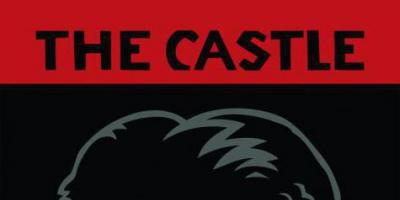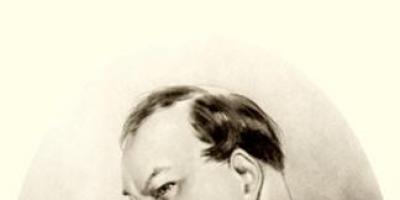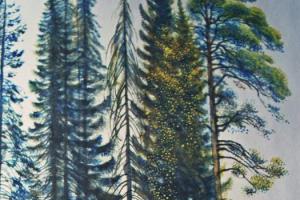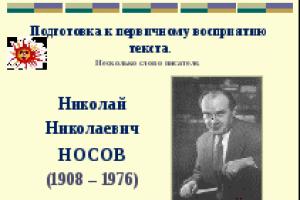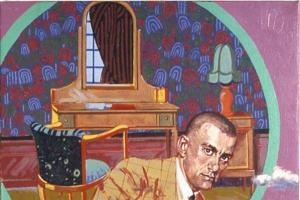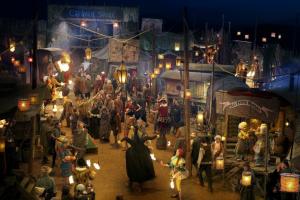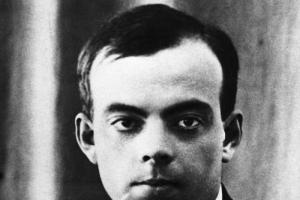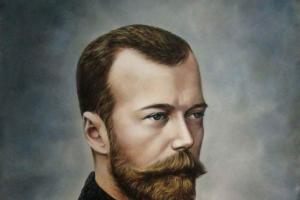Sections: Primary School
Goals:
- Continue your acquaintance with the works of N.N. Nosov.
- Development of memory, interest in reading, creative abilities of students.
- Develop the ability to analyze and evaluate the actions of heroes, relate them to one’s own life experience.
- To develop students’ speech by teaching them how to construct their own statements, creativity in predicting the content of the text.
- To develop the ability to control one’s activities and evaluate them based on objective indicators of knowledge.
- Cultivate moral qualities.
Equipment: exhibition of the writer's books, list of achievements, assignments, drawings.
Achievements list
Student(s)F.I.______________________________
During the classes
1. Organizational moment.
Hello guys!
Hello, dear guests!
Let's smile at each other, and smiles will make us all feel more comfortable and warmer!
It even became brighter in the classroom.
Let's get to work in a good mood.
2. Introduction to the lesson plan.
1. Class organization.
2. Checking homework.
3. Work on new material.
A) topic and goals.
B) vocabulary work.
B) "master of words"
4. Physical exercise.
5. Analysis of the work.
6. Homework.
7. Summing up.
I wish you fruitful work.
3. Checking homework.
What story did we learn about in the last lesson?
"Gardeners" by N.N. Nosov. frame No. 1 ( Presentation)
Do you know the content well? Let's check. (The children have leaves on their desks with 1 task:
1) Place the points of the plan in order.
1. Let's compete!
2. Getting started
3. “When there is no agreement among comrades:”
4. Cunning plan
5. "Oh, we are donkeys!"
6. We were taken in tow.
7. We still got the red banner.
(exchanged pieces of paper and checked their neighbor on the desk by comparing with the model on the board)
Evaluate yourself.
No errors +
Mistakes were made -
What was the creative task?
Each group demonstrates a fragment of the filmstrip, accompanied by reading the text.
2) “Demonstration” of the film strip “Gardeners”
Forward!
(children show a drawing and read an excerpt from the work) group 4 people - 1 with a drawing, 3 people. read by role).
Well done!
4. Preparing students for active and conscious learning of new material.
Read the notes to yourself from the notes on the cards. frame number 2.
What do they have in common?
These are the titles of stories by N.N. Nosov. These are fun, funny stories.
Yes, this is not the first lesson we have been studying (reading) the works of N. Nosov.
What do you know about this writer? What kind of person was he?
1) Testing knowledge of the writer’s biography:
On the green sheets of paper, leave the text (biography of the writer) only the reliable facts, cross out what is unnecessary.
(One person is at the board. He selects cards with the words necessary to fill in the missing words). frame number 3.
Let's check. Let's evaluate ourselves.
Who has this?
Put +, no -.
Conclusion: well done, you know the writer’s biography well.
What is characteristic of the works of N.N. Nosov?
They are short, funny, and clearly constructed.
This is how another wonderful writer Valentin Kataev speaks about N.N. Nosov. frame number 4.
2) Communicating the topic and goals of the material being studied.
What work will we learn about in class today?
Read starting with a capital letter. frame number 5.
What is a blot?
A blot is a stain caused by ink dripping from a pen.
What do we learn in literary reading lessons?
What are the objectives of today's lesson?
- Get acquainted with the work.
- Reveal the author's intention.
- Learn to read correctly (fluently, without errors, expressively).
The main question of the lesson?
What is the idea of the work? (written on the board)
3) Vocabulary work.
Purpose: At this stage we will talk about the meaning of some words that appear in the text. For what purpose do you think we will do this?
To understand the meaning of these words, enrich your vocabulary, and more accurately understand the meaning of the work.
The work will contain: words. If we cannot explain them, the interpreter will be: (Khadarovskaya Christina).
- bottle
- blisters
- lichen
- sores
- corrodes
- eraser
- amuse
Conclusion: We figured out the words. Well done.
4) Exercises to develop reading skills.
To avoid mistakes when reading, let's practice reading these words.
- Hurry - make you laugh
- Confused - scared
- Understand - raise
- Lower - let go
- Grabbed - boasted
- Rang - rang
(Who's ready for "house")
2) Exercises for the eyes.
Blink. Close your eyes tightly, then open them wide.
5. Familiarity with the text of the work. (master of words, People's Artist of the USSR Lev Durov - 5-minute recording). Analysis of a work (artistic image).
It's time to find out what this work is about.
Listen carefully to the master of words, People's Artist of the USSR Lev Durov.
Purpose: what genre do we classify the work into? Who is the main character? Follow the text, watch the intonation.
(listening for 5 minutes)
Did you like the piece? How?
Is your personality serious or funny, sad or joyful?
What genre does this work belong to?
Meets all the characteristics of the story.
Small volume, description of one episode, few characters.
Who is the main character of this work?
Fedya Rybkin. This hero has a set of certain character qualities.
But the text never directly mentions it.
Try now to identify the qualities that Fedya possesses.
Check +. (yellow leaves)
- Cruel
- Mischievous
- Selfish
- Vicious
- Funny
- Playful
- Hardworking
- Restless
- Prudent
- Sincere
- Responsible
We will know whether you are right or wrong when we find in the text those sentences and passages that help us learn about the character qualities of the hero.
How does the main character of the story appear to readers at the beginning of the work?
": He had a habit of making the whole class laugh: is it recess now or is it a lesson"
So what is he like?
Confirm with a description of his action:
"Fedya really liked the mascara on her nose"
antics
playful
How did Zinaida Ivanovna react to Fedya’s trick?
She was surprised. She told me what danger awaits Fedya.
Why did the teacher behave this way? Your opinion.
She wanted to tell the naughty boy a lesson, but so that he himself would understand his mistake.
Has Fedya changed after this whole story? What made him change?
"Fedya was scared: he stammered."
Read the passage that matches the illustration.
": Fedya started again: it didn’t help."
restless
sincere
Evaluate yourself.
No errors +
Mistakes were made -
What conclusions did Fedya make for himself?
": this week Fedya: and that’s not always the case"
Your attitude towards the hero at the beginning of the work.
With his behavior, he interfered with the rest of the children's studies. Disturbed the teacher. This is bad. After all, people come to school to gain knowledge, not to disrupt lessons, not to misbehave.
Your attitude towards the hero at the end of the story.
Well done, he understood and corrected himself.
Did you empathize with the hero?
The writer talks wittily and cheerfully about Fyodor Rybkin. The most ordinary life events turn into stories by N.N. Nosov in unusually funny instructive stories. The writer does not obsessively, without “adult moralizing,” shows the meaninglessness and absurdity of bad actions. He describes the anxiety and excitement experienced by a small schoolboy who has committed an unseemly act. Readers empathize with the characters because they themselves could find themselves in such situations.
Let's remember our main question of the lesson. To more accurately express your thoughts, use proverbs. (frame No. 6.) (frame No. 7).
Match the proverbs with the main idea of the story.
Underline those statements that reflect the main idea of the work. (pink leaves)
Justify your answer.
- Some learn from the experiences of others, and others from their mistakes.
- Know how to make a mistake, know how to get better.
- Patience and a little effort.
- If you hurry, you will make people laugh.
Evaluate yourself.
No errors +
Mistakes were made -
Have we answered the main question of the lesson?
7. Reflection.
Was the lesson interesting? (according to the table using signal circles)
Evaluating our joint work (use the evaluation table), I see that we have well-developed skills::::::, we need to work on developing:::.
8. Homework.
At home you will complete tasks related to the study of the work in class, and everyone will choose a task that is within their strength.
3)* Staging a small play based on this story.
You will succeed.
Blot
Summary of the story
The boy Fedya Rybkin loved to make the whole class laugh, it was even a habit. Once he got into a fight with Grisha Kopeikin over a bottle of mascara. And accidentally one drop fell on Fedya’s forehead. At first he was angry, but when he saw that all the guys were laughing, he decided that this blot on his forehead was even for the better.
The lesson began, and Fedya deliberately smeared himself even more with mascara. The guys roared with laughter. When the teacher noticed what Fedya had done, she told him that the mascara was chemical, poisonous, and would cause blisters and sores. Fedya got scared
And throughout the lesson I rubbed my face with either a blotter or a handkerchief, but nothing helped. He got scared and raised his hand to go out to wash, but the teacher did not let him go. Fedya already began to feel that her face was starting to itch, but the teacher said: “Nothing. Let it itch. But next time you won’t smear your face with anything.”
Fedya sat as if on pins and needles and kept clutching his face. During recess, Fedya ran to wash his face. I spent the entire recess rubbing my face with soap. Then Fedya walked around gravely all week: he kept expecting blisters to appear on his face. But the blisters never popped up, and during this week Fedya even forgot how to laugh in class. Now he laughs only during breaks, and even then not always.
LESSON SUMMARY in 4th grade
Subject: Literary reading Subject: Reading and Comprehension LessonstoryN. Nosova “Blot”.(Author of the textbook “Favorite Pages” O.V. Kubasova ) Lesson type: A lesson in “discovering” new knowledge Planned results. Personal results:- allow the existence of other points of view, listen to the interlocutor, do not interrupt, express your point of view calmly. know about the rules of school life, consciously apply them in literary reading lessons, justify their existence and benefits for the student. build a moral and ethical judgment from 2-3 sentences based on moral concepts and norms about the actions of one or another character in the work. to form an anti-corruption worldview, cultivating such moral qualities as duty, responsibility and justice.
- together with the teacher, formulate the educational task of the lesson in accordance with the goals of the topic; accept the learning task of the lesson.
identify known knowledge and skills from the topic of the lesson, determine the range of unknowns on the topic being studied
give self-esteem.
formalize your thoughts in oral and written speech, taking into account your educational and life speech situations.
participate in dialogue; listen and understand others, express your point of view on events and actions;
argue your point of view in the process of reflecting on the actions of literary heroes, evaluate the hero’s actions.- use analysis and synthesis techniques when studying short literary texts based on the teacher’s questions; Understand the figurative meaning of a figurative word, phrase or sentence, interpret them; analyze the motive of the hero’s behavior using questions.
- independently determine the theme of the work; under the guidance of the teacher, determine the main idea of the work;
development of artistic and creative abilities;
characterize the hero of the work under the guidance of a teacher (who is he? what is he like?);
2. Preparation for the initial perception of the text. Setting the lesson goal. Look at the book exhibitionGuess which author's work we will study today. Yes, also N. Nosova. But among the books there is an “extra” book. Find her (book by E. Nosov).A few words about the writer
 Take a closer look at the portrait of the writer. How does he appear to you? What works did Nosov write, in what genre? (stories). What topic? (0 children).Rebus
Take a closer look at the portrait of the writer. How does he appear to you? What works did Nosov write, in what genre? (stories). What topic? (0 children).Rebus
 Look at the slide. Guess the title of the story we will read today:(After guessing, the cover of the book appears on the board.)Working with the word.
What does the word "blot" mean? (Children’s answers.) In S.I. Ozhegov’s dictionary you can find the answer: “An ink stain on paper”
Look at the slide. Guess the title of the story we will read today:(After guessing, the cover of the book appears on the board.)Working with the word.
What does the word "blot" mean? (Children’s answers.) In S.I. Ozhegov’s dictionary you can find the answer: “An ink stain on paper” Do you think this is a modern word or an outdated one? Whoever works well in class will have the opportunity to write a real ink after the lesson.We will meet words again
Do you think this is a modern word or an outdated one? Whoever works well in class will have the opportunity to write a real ink after the lesson.We will meet words again “a bottle of mascara” (a bottle of paint); “pyatak” (5 kopeck coin); “at full speed” (very quickly); “to laugh” (laugh not out of malice), “shook her head sadly” (sadly), “sat as if on pins and needles” (restless).
“a bottle of mascara” (a bottle of paint); “pyatak” (5 kopeck coin); “at full speed” (very quickly); “to laugh” (laugh not out of malice), “shook her head sadly” (sadly), “sat as if on pins and needles” (restless).3.Primary perception of the text, checking primary perception. (Chain reading).How is this story similar to the previous one?
 (it’s about children; children find themselves in unusual situations, funny and sad at the same time; the texts are instructive).
(it’s about children; children find themselves in unusual situations, funny and sad at the same time; the texts are instructive).Dynamic pause (Stand on tiptoe, like Fedya, as many times as there are syllables in the words Fedya, Grigory, Zinaida.)
4.Analysis of a literary work. Open the dictionary of moods. Determine what kind of story this story is based on its mood? (serious and sad, funny, joyful). Find words from the text that support this. Drawing up portraits of the main characters
 How does the main character of the story, Fedya Rybkin, appear to the readers at the beginning of the story? (read out).How has Fedya changed at the end of the story? (read out).What feelings did Fedya experience during this story? (The necessary words are written on the board).Do you think Fedya can be called a naughty boy or a hooligan? Why?What made Fedya change?Why did Zinaida Ivanovna behave this way?What kind of Zinaida Ivanovna do you imagine? (wise, fair).Do you think the teacher is right in her attitude towards the boy? (Prove it).From whose perspective is the story being told? (on behalf of a boy, a student in this class).What can you say about Fedya's friend? (supported, offered a rubber band...)Find a proverb that fits the relationship between two friends
How does the main character of the story, Fedya Rybkin, appear to the readers at the beginning of the story? (read out).How has Fedya changed at the end of the story? (read out).What feelings did Fedya experience during this story? (The necessary words are written on the board).Do you think Fedya can be called a naughty boy or a hooligan? Why?What made Fedya change?Why did Zinaida Ivanovna behave this way?What kind of Zinaida Ivanovna do you imagine? (wise, fair).Do you think the teacher is right in her attitude towards the boy? (Prove it).From whose perspective is the story being told? (on behalf of a boy, a student in this class).What can you say about Fedya's friend? (supported, offered a rubber band...)Find a proverb that fits the relationship between two friends (“Not for service, but for friendship”). Explain its meaning.Find a picture for the text and a passage that matches this proverb.
(“Not for service, but for friendship”). Explain its meaning.Find a picture for the text and a passage that matches this proverb.Visual pause
 (“Pick up a bouquet”: give flowers to Zinaida Ivanovna. With our eyes we find a yellow flower, a blue one, a green one above the board...)
(“Pick up a bouquet”: give flowers to Zinaida Ivanovna. With our eyes we find a yellow flower, a blue one, a green one above the board...)5. Generalization of the analysis results. Reading by roles. How will we read: loudly or quietly? Why (Quiet, because there is a lesson in progress).In what tone will we read for Fedya? (anxious, restless).For Grisha? (preoccupied, businesslike) Lesson summary. What did the author want to teach us? (So that we do everything on time: study in class, have fun during breaks, take a responsible approach to the work we do). Which proverb fits this story? (“Business time – time for fun”)
 Creative task.
On the given pieces of paper, draw a blot and write a wish to Fedya (to the music).Draw it in such a way that it “comes to life”. What is this literary device called? (personification). What other literary device do you know? (comparison). Compare the blot, what does it look like? (on a cloud, puddle...)What do the blots on the slide look like?
Creative task.
On the given pieces of paper, draw a blot and write a wish to Fedya (to the music).Draw it in such a way that it “comes to life”. What is this literary device called? (personification). What other literary device do you know? (comparison). Compare the blot, what does it look like? (on a cloud, puddle...)What do the blots on the slide look like? Remember in which fairy tale one careless student made a blot in his notebook? (on the board is an illustration for the fairy tale “The Adventures of Pinocchio”)
Remember in which fairy tale one careless student made a blot in his notebook? (on the board is an illustration for the fairy tale “The Adventures of Pinocchio”) Self-assessment
using red, green and yellow cards.Homework
.
Reading by roles; imagine yourself as the author and think about what you would change in the story.
Self-assessment
using red, green and yellow cards.Homework
.
Reading by roles; imagine yourself as the author and think about what you would change in the story. Don't waste your time -
Read Nosov's books!
Don't waste your time -
Read Nosov's books!
After the lesson, the children put blots on pieces of paper and share with each other their opinions on what they look like.
The main character of this story, Fedya Rybkin, always amused his classmates. But he entertained the class not only during lessons, but also during breaks. The teacher got tired of this and decided to teach Fedya good behavior.
Blob's story download:
Read the Blob's story
I'll tell you about Fedya Rybkin, how he made the whole class laugh. He had a habit of making guys laugh. And he didn’t care: it was a break now or a lesson. So here it is. It started when Fedya got into a fight with Grisha Kopeikin over a bottle of mascara. But to tell the truth, there was no fight here. Nobody hit anyone. They simply tore the bottle out of each other’s hands, and the mascara splashed out of it, and one drop landed on Fedya’s forehead. This left him with a black blot the size of a nickel on his forehead.
At first Fedya got angry, and then he saw that the guys were laughing, looking at his blot, and decided that this was even better. And he did not wash off the blot.
Soon the bell rang, Zinaida Ivanovna came, and the lesson began. All the guys looked back at Fedya and slowly laughed at his blot. Fedya really liked that he could make the kids laugh with just his appearance. He deliberately stuck his finger into the bottle and smeared his nose with mascara. No one could look at him without laughing. The class became noisy.
At first Zinaida Ivanovna could not understand what was the matter, but soon she noticed Fedya’s blot and even stopped in surprise.
“What did you stain your face with, mascara?” she asked.
“Yeah,” Fedya nodded his head.
– What mascara? This one? Zinaida Ivanovna pointed to the bottle that stood on the desk.
“This one,” Fedya confirmed, and his mouth parted almost to his ears.
Zinaida Ivanovna put her glasses on her nose and looked at the black spots on Fedya’s face with a serious look, after which she sadly shook her head.
“You did it in vain, in vain!” she said.
“What?” Fedya became worried.
– Yes, you see, this mascara is chemical, poisonous. It eats away at the skin. As a result, the skin first begins to itch, then blisters appear on it, and then lichens and ulcers appear all over the face.
Fedya was scared. His face fell and his mouth opened of its own accord.
“I won’t smear myself with mascara anymore,” he mumbled.
“Yes, I really think you won’t do it again!” Zinaida Ivanovna grinned and continued the lesson.
Fedya quickly began to wipe away the mascara stains with a handkerchief, then turned his frightened face to Grisha Kopeikin and asked:
“Yes,” Grisha said in a whisper. Fedya again began to rub his face, rubbing it with a handkerchief and a blotter, but the black spots were deeply ingrained into the skin and did not rub off. Grisha handed Fedya an eraser and said:
- Here you go. I have a wonderful elastic band. Rub it, try it. If she doesn't help you, then it's a lost cause.
Fedya began to rub Grisha’s face with the rubber band, but that didn’t help either. Then he decided to run to wash himself and raised his hand. But Zinaida Ivanovna, as if on purpose, did not notice him. He stood up, then sat down, then rose on his tiptoes, trying to stretch his arm as high as possible. Finally Zinaida Ivanovna asked what he needed.
“Let me go wash,” Fedya asked in a plaintive voice.
– Is your face already itching?
“No,” Fedya hesitated. “It doesn’t seem to be itching yet.”
- Well, then sit down. You'll have time to wash yourself during recess.
Fedya sat down and again began to wipe his face with a blotter.
“Are you itching?” Grisha asked worriedly.
- No, it doesn’t seem to itch... No, it seems to itch. I can’t tell if it’s itching or not. It seems like it's already itching! Well, look, are there any more blisters?
“There are no blisters yet, but everything around is already red,” Grisha said in a whisper.
“Red?” Fedya was frightened. “Why did it turn red?” Maybe blisters or sores are already starting?
Fedya again began to raise his hand and ask Zinaida Ivanovna to let him wash.
“It’s itchy!” he whined.
Now he had no time to laugh. And Zinaida Ivanovna said:
- Nothing. Let it itch. But next time you won’t smear your face with anything.
Fedya sat as if on pins and needles and kept clutching his face with his hands. It began to seem to him that his face was actually starting to itch, and bumps were already beginning to swell in place of the spots.
“You better not have three,” Grisha advised him.
Finally the bell rang. Fedya was the first to jump out of the classroom and ran as fast as he could to the washbasin. There he spent the entire recess rubbing his face with soap, and the whole class was making fun of him. Finally he wiped the mascara stains clean and walked around looking serious for a whole week after that. I kept expecting blisters to appear on my face. But the blisters never popped up, and during this week Fedya even forgot how to laugh in class. Now he laughs only during breaks, and even then not always.
5.12. 2013
Lesson
Literary reading
4th grade
Topic: Nature of the work. N. Nosov “Blot”.
Lesson form : Lesson - workshop
Lesson objectives:
- Continue your acquaintance with the works of N.N. Nosov.
Ensuring a deep understanding of the text through practical activities;
Development of memory, interest in reading, creative abilities of students.
R development of independent reading skills, imagination, thinking, creative abilities, and the ability to work in groups.
Develop the ability to analyze and evaluate the actions of heroes, relate them to one’s own life experience.
To develop students’ speech by teaching them how to construct their own statements, creativity in predicting the content of the text.
To develop the ability to control one’s activities and evaluate them based on objective indicators of knowledge.
Cultivate moral qualities.
During the classes
I. Organizational moment.
II. Target setting.
Today in class we are starting to work on a new piece. We will work in groups of 6 people. Lessonwill take place in the form of a workshop.
III. Work on the topic of the lesson.
1.Acquaintance with the text.
I divided the text of the story into 4 parts and printed them on sheets of different colors.
Take apart the colored sheets of paper and read the passages of the story printed on them.(Annex 1)
2. Retelling and combining passages into a story.
In groups, retell the passage you read and try to arrange the sheets so that you get a story.
- In what order are the sheets arranged by color?(Green, pink, blue, yellow. The sheets should be in this order. Each group names its own order of sheets. If there are inaccuracies, they are not corrected at this stage.)
Now listen to the story written by the author and check the accuracy of your assignment.
(reading the text of the story by the teacher)
- In which group was the story reconstructed in the same order as the author's?
This wonderful story was written by Nikolai Nikolaevich Nosov.(portrait, writing the author’s name on the board)We are already familiar with many of the works of this author and his biography.
5. Title of the story.
Discuss in groups what this story could be called. Introduce your name and explain its origin.(students discuss a possible title, write it down on pieces of paper, then attach the sheet to the board and explain why the story was called that way)
N. N. Nosov called this story “The Blob.”
6. Testing the perception of the text. Physical exercise.
"Assertions"
If you agree with my statement, raise your hands up and nod your head “yes,” if you don’t agree, stomp your feet and nod your head “no.”
1) At the beginning of the story, Fedya Rybkin appears to the reader as a serious student.
2) Fedya did not wash off the blot because the guys laughed while looking at it.
3) Grisha offered Fedya a handkerchief so that he could erase the blot.
4) Zinaida Ivanovna was delighted when she saw Fedya’s dirty face.
5) Fedya had no time to laugh, because he was afraid that his face would be covered with blisters.
6) Fedya’s behavior upset the teacher.
7) Zinaida Ivanovna deliberately pretended not to notice Fedya’s raised hand.
8) Fedya forgot how to laugh in class in a month.
7. Creative task.
Each group has a task written down on an orange piece of paper. Read it and start implementing it.(Appendix 2)
IV.Homework.
Each group will also have its own homework.
Take strips of white paper and read the task.(Appendix 3)
Which group will perform which task?
V. Lesson summary.
VI. Relaxation.
There are 4 ratings printed on large sheets of white paper. Choose the one that you think can be used to evaluate our lesson and paint it with any color. (Appendix 4)
Applications.
Annex 1
(on green sheets)
I'll tell you about Fedya Rybkin, how he made the whole class laugh. He had a habit of making guys laugh. And he didn’t care: it was a break now or a lesson. So here it is. It started when Fedya got into a fight with Grisha Kopeikin over a bottle of mascara. But to tell the truth, there was no fight here. Nobody hit anyone. They simply tore the bottle out of each other’s hands, and the mascara splashed out of it, and one drop landed on Fedya’s forehead. This left him with a black blot the size of a nickel on his forehead.
At first Fedya got angry, and then he saw that the guys were laughing, looking at his blot, and decided that this was even better. And he did not wash off the blot.
(on pink sheets)
Soon the bell rang, Zinaida Ivanovna came, and the lesson began. All the guys looked back at Fedya and slowly laughed at his blot. Fedya really liked that he could make the kids laugh with just his appearance. He deliberately stuck his finger into the bottle and smeared his nose with mascara. No one could look at him without laughing. The class became noisy.
At first Zinaida Ivanovna could not understand what was going on here, but she soon noticed Fedya’s blot and even stopped in surprise.
What did you stain your face with, mascara? – she asked.
“Yeah,” Fedya nodded his head.
Zinaida Ivanovna pointed to the bottle that stood on the desk.
This one,” Fedya confirmed, and his mouth parted, almost to his ears.
Zinaida Ivanovna put her glasses on her nose and looked at the black spots on Fedya’s face with a serious look, after which she sadly shook her head.
You did it in vain, in vain! - she said.
And what? – Fedya became worried.
Yes, you see, this mascara is chemical and poisonous. It eats away at the skin. Because of this, the skin first begins to itch, then blisters appear on it, and then lichens and ulcers appear all over the face.
Fedya was scared. His face fell and his mouth opened of its own accord.
“I won’t wear mascara anymore,” he mumbled.
“Yes, I think you won’t do it again,” Zinaida Ivanovna grinned and continued the lesson.
(on blue sheets)
Fedya quickly began to wipe away the mascara stains with a handkerchief, then turned his frightened face to Grisha Kopeikin and asked:
Eat?
“Yes,” Grisha said in a whisper.
Fedya again began to rub his face with a handkerchief, but the black spots were deeply ingrained into the skin and did not erase.
Grisha handed Fedya an eraser and said:
Here you go. I have a wonderful rubber band. Rub it and try it. If she doesn't help you, then it's a lost cause.
Fedya began to rub Grisha’s face with the gum, but it didn’t help. Then he decided to run to wash himself and raised his hand. But Zinaida Ivanovna, as if on purpose, did not notice him. He stood up, then sat down, then rose on his tiptoes, trying to stretch his arm as high as possible. Finally Zinaida Ivanovna asked what he needed.
“Let me go and wash,” Fedya asked in a plaintive voice.
Is your face already itching?
N-no, Fedya hesitated. “It doesn’t seem to be itching yet.”
Well, then sit down. You'll have time to wash your face during recess.
Fedya sat down and again began to wipe his face with a blotter.
Is it itchy? – Grishka asked worriedly.
N-no, it doesn’t seem to itch... no, it seems to itch. I can’t tell if it’s itching or not. It seems like it's already itching! Well, look, are there any more blisters?
There are no blisters yet, but everything around is already red,” Grisha said in a whisper.
Are you blushing? – Fedya was scared. - Why did it turn red? Maybe blisters or sores are already starting?
Fedya again began to raise his hand and ask Zinaida Ivanovna to let him wash.
It's itchy! - he whined.
Now he had no time to laugh. And Zinaida Ivanovna said:
Nothing. Let it itch. But next time you won’t smear your face with anything.
(on yellow sheets)
Fedya sat as if on pins and needles and kept clutching his face with his hands. It began to seem to him that his face was actually starting to itch, and bumps were already beginning to swell in place of the spots.
You’d better not have three, Grishka advised him.
Finally the bell rang. Fedya was the first to jump out of the classroom and ran as fast as he could to the washbasin. There he spent the entire recess rubbing his face with soap, and the whole class was making fun of him. Finally, he wiped the mascara stains clean and walked around looking serious for a whole week after that. I kept expecting blisters to appear on my face. But the blisters never popped up, and during this week Fedya even forgot how to laugh in class. Now he laughs only during breaks, and even then not always.
Appendix 2
(on orange sheets)
Come up with two questions about the content for the first, second and third parts of the story.
Appendix 3

